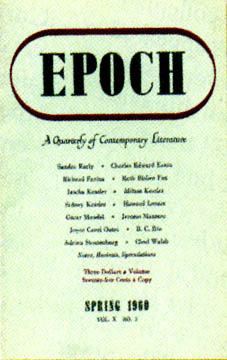"God Bless America and All the Ships at Sea"
Epoch, vol. X, no. 3; Spring 1960. pp. 161-170.
 Epoch was published by the creative writing program of Cornell's English
Department, though this story was published after Fariņa had left Cornell. (An
earlier issue, Spring 1959, had printed Thomas
Pynchon's short story, "Mortality and Mercy in Vienna.")
Epoch was published by the creative writing program of Cornell's English
Department, though this story was published after Fariņa had left Cornell. (An
earlier issue, Spring 1959, had printed Thomas
Pynchon's short story, "Mortality and Mercy in Vienna.")
The full text of the story is reprinted here.
Plot Summary:
"God Bless America and All the Ships at Sea" is about two college students
hitchhiking across
the desert, headed for Albuquerque. One of them says
he is "looking for experience" because he feels that
life is passing him by. At a gas station they run into three kids, ages
12-16, dressed in dusty farm clothes, traveling from Oklahoma to Califoria.
The college students want to hitch a ride from them, but when they learn that the
kids are driving a stolen car and that and the brakes don't work, they have second
thoughts. While the college students debate about whether to
go along in the car, the farmboys decide they don't want to bring them along and
they take off without them. And that's all there is to the story.
An interpretation:
Fariņa seems to be
satirizing the suburban hobo
phenomenon of the sixties, which was made fashionable a couple of
years later by Dylan, Eric Andersen, and Fariņa himself--young men who left
their comfortable middle class homes
in search of experience. The story was published in 1960, before Dylan and his
crowd became famous, but there is
a reference to "folksingers" in the story. Fariņa was working in Manhattan
by 1960, and hanging out in Greenwich Village, where he would have seen the early
phase of this phenomenon (which I believe had started with the Beats).
Fariņa's clue that the farm boys were from Oklahoma--which was of course the home
state of Woody Guthrie--suggests that they are "the real thing." The college
students, on the other hand, can only pretend to be the real thing, the restless
wanderers: they exhibit a stifling caution, a sterile a pre-meditatedness in their
quest for experience, that contrasts sharply with the
carefree farmboys riding a stolen car across the country with no brakes.
The college students halt and hesitate, debating about
what they should do, while the farm boys just go ahead and do it.
I am told that the title of the story alludes to a famous broadcaster from the
thirties and forties who began his program with the phrase, "God
Bless America and All the Ships at Sea." Fariņa often used "God Bless America"
ironically: Gnossos murmurs the phrase to himself
when he witnesses the atomic explosion in chapter 6 of Been Down So Long,
and of course the phrase appears in "House Un-American Blues
Activity Dream." We find a similar irony in Dylan's "With God on our Side."
Home
 Epoch was published by the creative writing program of Cornell's English
Department, though this story was published after Fariņa had left Cornell. (An
earlier issue, Spring 1959, had printed Thomas
Pynchon's short story, "Mortality and Mercy in Vienna.")
Epoch was published by the creative writing program of Cornell's English
Department, though this story was published after Fariņa had left Cornell. (An
earlier issue, Spring 1959, had printed Thomas
Pynchon's short story, "Mortality and Mercy in Vienna.")